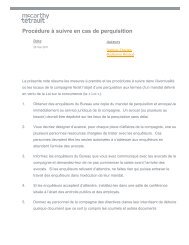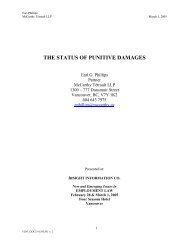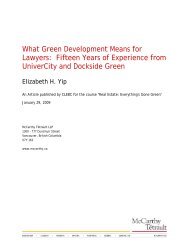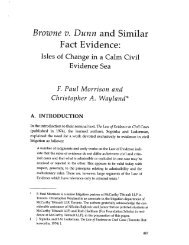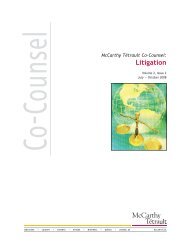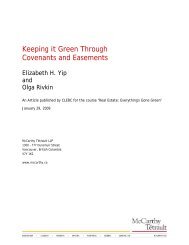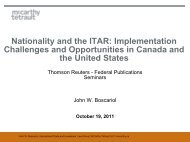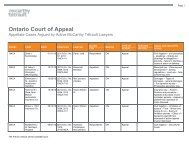The Doctrine of Public Policy in Canadian Contract Law
The Doctrine of Public Policy in Canadian Contract Law
The Doctrine of Public Policy in Canadian Contract Law
Create successful ePaper yourself
Turn your PDF publications into a flip-book with our unique Google optimized e-Paper software.
32 / Annual Review <strong>of</strong> Civil Litigation<br />
IV. PUBLIC POLICY IN PRACTICE<br />
While the doctr<strong>in</strong>e <strong>of</strong> public policy is by its very nature a concept that is<br />
mired <strong>in</strong> theory and legal pr<strong>in</strong>ciple, it has, like all common law concepts,<br />
developed through the crucible <strong>of</strong> litigation. Indeed, as noted previously <strong>in</strong> this<br />
paper, the doctr<strong>in</strong>e rema<strong>in</strong>s <strong>of</strong> great practical importance to parties embroiled<br />
<strong>in</strong> contractual disputes. It will therefore be useful to briefly explore some <strong>of</strong> the<br />
evidentiary and remedial issues which arise <strong>in</strong> connection with the doctr<strong>in</strong>e,<br />
before turn<strong>in</strong>g to consider its normative rationales."'<br />
I. Evidentiary Issues<br />
<strong>The</strong>re are two primary contexts <strong>in</strong> which evidentiary issues may arise <strong>in</strong><br />
relation to the doctr<strong>in</strong>e <strong>of</strong> public policy: (1) where a party seeks to prove that<br />
the content <strong>of</strong> public policy embraces a specific proposition; and (2) where a<br />
party seeks to prove that a specific contract is <strong>in</strong> violation <strong>of</strong> the doctr<strong>in</strong>e.<br />
Because the courts have traditionally regarded public policy as a question <strong>of</strong><br />
law, they have <strong>of</strong>ten held that no evidence is admissible to "show what public<br />
policy is or to show the effect <strong>of</strong> a contract or disposition alleged to <strong>in</strong>fr<strong>in</strong>ge<br />
public policy."172 Nevertheless, this pr<strong>in</strong>ciple has occasionally been lamented<br />
by the judiciary. In Mogul Steamship Co. v. McGregor, Gow & Co., for <strong>in</strong>stance,<br />
Lord Bramwell stated that:<br />
[n]o evidence is given <strong>in</strong> these public policy 'cases. <strong>The</strong> tribunal is to say, as<br />
matter <strong>of</strong> law, that the th<strong>in</strong>g is aga<strong>in</strong>st public policy, and void. How can the judge<br />
do that without any evidence as to its effect and consequences"' [emphasis<br />
added]<br />
<strong>The</strong> prohibition upon the receipt <strong>of</strong> evidence for the purposes <strong>of</strong> identify<strong>in</strong>g<br />
the content <strong>of</strong> public policy does not preclude the courts from tak<strong>in</strong>g<br />
171 <strong>The</strong>re are <strong>of</strong> course additional practical issues that can arise <strong>in</strong> relation to the doctr<strong>in</strong>e<br />
<strong>of</strong> public policy, but they are unfortunately beyond the ambit <strong>of</strong> the current paper. One<br />
such issue concerns the proper law <strong>of</strong> public policy; if a contract governed by the law<br />
<strong>of</strong> one state is sought to be enforced <strong>in</strong> another, which jurisdiction's public policy doctr<strong>in</strong>e<br />
should be applicable Arguably, the supra-legal nature <strong>of</strong> the doctr<strong>in</strong>e entails that the<br />
enforc<strong>in</strong>g jurisdiction should apply its own public policy rules regardless <strong>of</strong> the govern<strong>in</strong>g<br />
law. However, there is authority to suggest that the enforc<strong>in</strong>g jurisdiction will only<br />
apply the domestic doctr<strong>in</strong>e <strong>of</strong> public policy which has developed <strong>in</strong> connection with<br />
conflict <strong>of</strong> laws pr<strong>in</strong>ciples rather than contract law pr<strong>in</strong>ciples: see K. (E.)v. K. (D.), 2005<br />
BCCA 425 (C.A.) at paras. 22-24; and the discussion at footnote 124 above..<br />
172 Decker! v. Prudential Insurance Co., [1943] O.R. 448, [1943] O.J. No. 467 (C.A.) at<br />
para. 34.<br />
173 (1891), [1892] A.C. 25 (H.L.) at 45.



